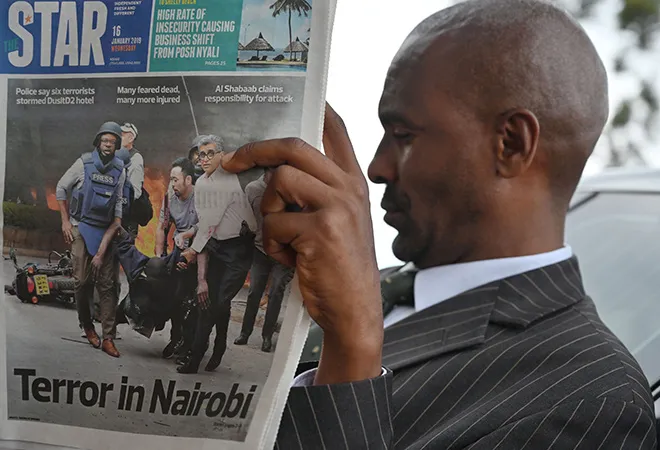-
CENTRES
Progammes & Centres
Location
Both India and Africa strongly acknowledge that peace and security is intrinsically linked to development, and that terrorism poses the biggest threat to humanity. Naturally then — all Indo-African efforts have focused on rooting out terrorism in all its forms and manifestations.

Over the past week, gruesome reports of 50 people being beheaded by Islamist militants known to be identifying themselves as part of the so-called Islamic State (ISIS or Daesh in Arabic) shed fresh spotlight on violence taking place in Mozambique on the East African coast. In the country’s northern resource-rich Cabo Delgado region, Islamist insurgency has been steadily picking pace. In August, militants reportedly belonging to pro-ISIS Ansar al-Sunna took control of a strategic port in the same region, driving away the state’s security and armed forces, burning down villages, and instilling fear in the local population, reminiscence of the territorial grabs ISIS successfully orchestrated in both Iraq and Syria 2013 onwards. And similar to ISIS in Middle East in its initial stages, the recruitment committed by Ansar al-Sunna since 2017 has largely based around local grievances, tapping into the minority status of Muslims in the country, economic destitution and corruption.
India — which now plans to expand its diplomatic prowess significantly after announcing 18 new diplomatic missions across the continent in 2018 — stands at an opportune juncture to aggressively offer aid and experience in the sphere of counter-terrorism and counter-insurgency.
However, Mozambique is not the only region in Africa witnessing the rise of Islamist groups. The African Sahel region has not only been home to both pro-ISIS and pro-Al Qaeda militancy in the recent past, but is increasingly becoming a more convenient political and geographical vacuum for these groups to thrive in, away from the glare of much of international community’s attention. Countries such as Mali, Nigeria, Chad and other regional states have seen the growth of the Islamic State West Africa Province (ISWAP), the Islamic State Central Africa Province (ISCAP), Al Qaeda in Islamic Maghreb (AQIM) and an increasing number of smaller factions that move in and out of larger Islamist alliances. While these groups cement themselves in the Sahel, in countries such as Somalia, Kenya, Sudan and others, Al-Qaeda affiliate Al-Shabaab (and its various strains) has been both strengthening its brand while simultaneously facing counter-terror measures led by the West. To put the argument in colour, while ISIS revolutionised online propaganda from a terror group’s perspective, it was in fact Al-Shabaab and its attack on the Westgate Mall in Nairobi, Kenya, in September 2013, details of which the group posted on Twitter in real time that highlighted the advent of social media as a force multiplier for terrorism and related propaganda.
With this providing an increasingly bold security challenge in Africa, India, which now plans to expand its diplomatic prowess significantly after announcing 18 new diplomatic missions across the continent in 2018 stands at an opportune juncture to aggressively offer aid and experience in the sphere of counter-terrorism and counter-insurgency (COIN).
Terrorism and violent extremism pose a significant and growing threat to peace and security in Africa and is assuming unprecedented scales of expansion and intensity both within and beyond the continent. Over the years, terrorist groups like Al Shabaab, Boko Haram, Ahlu Sunnah Wa-Ja’ma, Lord’s Resistance Army amongst others have started to use increasingly sophisticated tools and have morphed into well-organized shadow governments. Such terrorist groups in Africa have become a key factor of instability. For two decades, the African Union (AU) has been actively engaged in continental efforts to prevent and combat terrorism and has adopted various instruments to facilitate and promote a coordinated action against terrorism.
Financial and human resource capacity constraints, along with lack of political will, presents significant challenges.
African efforts to combat terrorism have ranged from the 1999 Algiers Convention and its supplementary 2004 Protocol, as well as the 2002 AU Plan of Action on the Prevention and Combatting of Terrorism, to the establishment of the African Centre for the Study & Research on Terrorism (ACSRT) in 2004, and the African Standby Force (ASF) in 2010. These counter-terrorism instruments have helped to provide a sound legal and institutional basis for enhanced cooperation among African countries, particularly as it relates to exchange of information on movement of terrorist groups, exchange of research and expertise, and mobilisation of technical assistance both from within and outside Africa. However, financial, and human resource capacity constraints, along with lack of political will presents significant challenges. In many instances, several counter-terrorism initiatives in Africa have not received much finance, in part because terrorism is not always a high priority for African countries when compared to more pressing economic, developmental, and poverty eradication issues. Despite their magnitude, anti-terrorism efforts in Africa remains fragmented and incommensurate with the scale of the threats. According to the African Centre for the Study and Research on Terrorism (ACSRT), till August 2020, Africa recorded a total of 183 terrorist attacks resulting in around 763 casualties, with DRC, Somalia, Mali, Mozambique, and Burkina Faso being the most affected countries.
Therefore, stronger international partnership in countering terrorism and violent extremism, including through increased sharing of information and intelligence, is essential for African countries to defeat Islamist militancy. Countries like India, which has had a long-standing presence in the continent, as evidenced by its contribution to UN peacekeeping missions, humanitarian assistance and disaster relief operations, setting up of Defence Academies and Colleges, and conducting defence training programmes for African security and military personnel, is well placed to become Africa’s steadfast defence and security partner.
Over the last decade, defence and security cooperation has emerged as a key 21st century pillar for India and African countries given the affinity and compatibility between our strategic doctrines, military traditions, command structures, and training protocols. Both India and Africa strongly acknowledge that peace and security is intrinsically linked to development, and that terrorism poses the biggest threat to humanity. Naturally then, all Indo-African efforts have focused on rooting out terrorism in all its forms and manifestations, disrupting terrorist networks, eliminating financial channels (hawala system), and halting cross-border movements.
Issues such as counter-terrorism, and combatting violent extremism and transnational crimes, are focus areas that align with the Agenda 2063 along with India’s Africa agenda.
Over the last couple of years, two important initiatives have been initiated that points toward India and Africa’s growing security ties. First is the inaugural Africa-India Field Training Exercise (AFINDEX) that took place in March 2019 in Pune and was attended by contingents from 17 African countries. The exercises mainly aimed at planning and conduct of humanitarian mine assistance and peacekeeping operations, through sharing of best practices and tactical level operations in the conduct of United Nations-mandated tasks. The second initiative is the first-ever India-Africa Defence Ministers Conclave (IADMC) that was held in February 2020 in Lucknow. Defence Ministers and Service Chiefs from 14 African countries participated in addition to delegates from 38 African countries. The event led to the adaptation of the Lucknow Declaration, which pertains specifically to defence, military, and security cooperation.
This year also provides a unique opportunity for India and African countries to consolidate its security partnership. The AU’s theme this year, “Silencing the Guns: Creating Conducive Conditions for African Development” is an African initiative that aims to promote prevention, management, and resolution of all forms of armed conflict. Such efforts are rooted in common aspirations as envisioned under Africa’s Agenda 2063 and the 10 Guiding Principles for India Africa Engagement, as espoused by Prime Minister Narendra Modi in 2018. Issues such as counter-terrorism, and combatting violent extremism and transnational crimes, are focus areas that align with the Agenda 2063 along with India’s Africa agenda.
A recent survey conducted by Afrobarometer showcased that external security presence, particularly of China in the Sahelian region through its growing involvement in peace and security and infrastructure projects, led to a surge in positive perceptions and opinions among African citizens on China’s role in Africa. Naturally then, if India wants to increase its overseas presence in Africa, it must accompany opening of new resident missions along with an increase of Indian troop contributors to UN peacekeeping efforts along with greater investments from the private sector in infrastructure projects. All these will add to a gradually stronger security narrative, provided it is backed up in long-term both by political will and indelible institutionalisation of such security cooperation.
Going forward, stronger collaboration in counter-terrorism will have to figure prominently in India’s Africa engagement if India wants to become a reliable defence and security partner of African countries. Apart from regular interactions at DefExpo and Aero India, Indian defence firms’ visibility in African markets needs to increase substantially. India can consider exporting Akash Surface to Air Missile System, Light Combat Aircraft (LCA Tejas), Offshore Patrol Vessels, Dornier Do-228 aircraft, Sport Utility Vehicles, Dhanush Artillery Gun System, light arms and ammunitions, and night vision equipment to African states that share a common vision. This will not only strengthen India’s partnership with Africa but will also enhance African capabilities to tackle terrorism.
Indian defence firms’ visibility in African markets needs to increase substantially.
New Delhi is also in a good position to diplomatically, strategically and tactically collaborate with international partners already active in counter-terror activities and capacity building in the continent. Both France and the US are major players in this regard, and India’s increasing proximity to both Washington DC and Paris in the global security sphere, as witnessed today in the Indo-Pacific and Asia in general, is a replicable partnership on issues of global-common aims such as defeating terrorism.
The views expressed above belong to the author(s). ORF research and analyses now available on Telegram! Click here to access our curated content — blogs, longforms and interviews.

Kabir Taneja is a Deputy Director and Fellow, Middle East, with the Strategic Studies programme. His research focuses on India’s relations with the Middle East ...
Read More +
Abhishek Mishra is an Associate Fellow with the Manohar Parrikar Institute for Defence Studies and Analysis (MP-IDSA). His research focuses on India and China’s engagement ...
Read More +